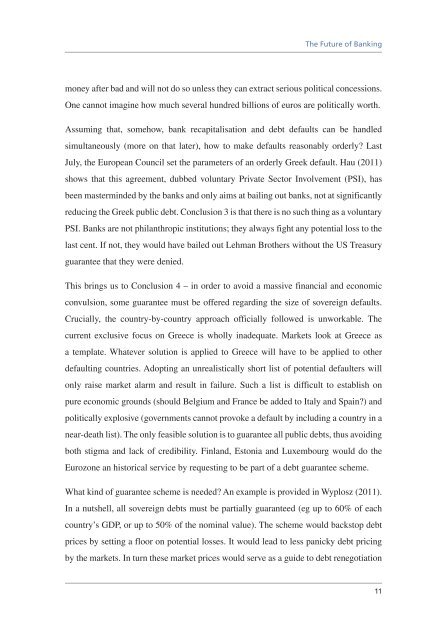You also want an ePaper? Increase the reach of your titles
YUMPU automatically turns print PDFs into web optimized ePapers that Google loves.
The Future of Banking<br />
money after bad and will not do so unless they can extract serious political concessions.<br />
One cannot imagine how much several hundred billions of euros are politically worth.<br />
Assuming that, somehow, bank recapitalisation and debt defaults can be handled<br />
simultaneously (more on that later), how to make defaults reasonably orderly? Last<br />
July, the European Council set the parameters of an orderly Greek default. Hau (2011)<br />
shows that this agreement, dubbed voluntary Private Sector Involvement (PSI), has<br />
been masterminded <strong>by</strong> the banks and only aims at bailing out banks, not at significantly<br />
reducing the Greek public debt. Conclusion 3 is that there is no such thing as a voluntary<br />
PSI. Banks are not philanthropic institutions; they always fight any potential loss to the<br />
last cent. If not, they would have bailed out Lehman Brothers without the US Treasury<br />
guarantee that they were denied.<br />
This brings us to Conclusion 4 – in order to avoid a massive financial and economic<br />
convulsion, some guarantee must be offered regarding the size of sovereign defaults.<br />
Crucially, the country-<strong>by</strong>-country approach officially followed is unworkable. The<br />
current exclusive focus on Greece is wholly inadequate. Markets look at Greece as<br />
a template. Whatever solution is applied to Greece will have to be applied to other<br />
defaulting countries. Adopting an unrealistically short list of potential defaulters will<br />
only raise market alarm and result in failure. Such a list is difficult to establish on<br />
pure economic grounds (should Belgium and France be added to Italy and Spain?) and<br />
politically explosive (governments cannot provoke a default <strong>by</strong> including a country in a<br />
near-death list). The only feasible solution is to guarantee all public debts, thus avoiding<br />
both stigma and lack of credibility. Finland, Estonia and Luxembourg would do the<br />
Eurozone an historical service <strong>by</strong> requesting to be part of a debt guarantee scheme.<br />
What kind of guarantee scheme is needed? An example is provided in Wyplosz (2011).<br />
In a nutshell, all sovereign debts must be partially guaranteed (eg up to 60% of each<br />
country’s GDP, or up to 50% of the nominal value). The scheme would backstop debt<br />
prices <strong>by</strong> setting a floor on potential losses. It would lead to less panicky debt pricing<br />
<strong>by</strong> the markets. In turn these market prices would serve as a guide to debt renegotiation<br />
11














